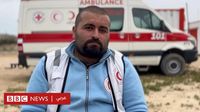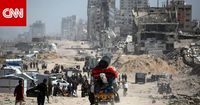In a significant turn of events, a senior source from Hamas revealed to CNN on Thursday, April 3, 2025, that the group has rejected a recent Israeli proposal for a ceasefire in Gaza. This proposal, which included a 40-day truce in exchange for the release of 11 hostages, has sparked renewed tensions in the region.
The Israeli offer, which was described as a counter-proposal after Hamas agreed to an Egyptian suggestion to release five hostages, including American-Israeli soldier Aidan Alexander, was met with immediate dismissal from Hamas. The Israeli proposal stipulated the release of 11 living hostages along with the bodies of half of the deceased hostages in exchange for the ceasefire. As of now, it is reported that 24 hostages are alive in Gaza, while 35 deceased hostages are still unaccounted for.
As the situation escalates, Israel has intensified its military operations in Gaza, a campaign that officials claim will continue until all remaining hostages are freed. According to the Gaza Ministry of Health, over 100 Palestinians were killed in the past 24 hours alone, bringing the total death toll in the Strip to 1,163 since Israel resumed its attacks last month. This military action follows Hamas's assault on October 7, 2023, which marked the beginning of the current conflict.
Meanwhile, the humanitarian situation continues to deteriorate. In a separate incident, Munder Aabed, the sole survivor of an attack on a medical team in Gaza, shared his harrowing experience with BBC News. Aabed, a medic with the Palestinian Red Crescent, provided a detailed account of the attack that resulted in the deaths of 15 of his colleagues, contradicting the Israeli narrative.
According to Aabed, on March 23, 2025, at around 4:30 AM, ambulances were dispatched to respond to reports of gunfire and injuries in Rafah. He recounted how the first two ambulances left at approximately 4:40 AM, followed by another at 4:50 AM. By around 5:00 AM, an UNRWA ambulance was struck by direct gunfire. Aabed managed to survive by hiding in the back of his ambulance, while his colleagues in the front were shot at.
The Israeli army has claimed that its forces opened fire on the ambulances because they were moving suspiciously and without lights, alleging that Hamas and Islamic Jihad fighters were present in the vehicles. However, Aabed firmly disputes this assertion, stating that all emergency lights were operational and the ambulances were clearly marked as humanitarian vehicles.
In response to the incident, Amnesty International has called for an independent and impartial investigation into the deaths of the medical workers, emphasizing that they were on a humanitarian mission. The organization has demanded immediate access for independent observers to the Gaza Strip.
During the funerals for the fallen medics in Gaza, a somber atmosphere prevailed as families mourned their loved ones. One father, Ashraf Abu Laba, expressed his grief, stating that his son was killed “in cold blood.” The international community has been largely unable to reach the area to assist, leaving many victims trapped in the rubble near the ambulances and aid vehicles, which were all damaged during the attack.
Sam Rose, the acting director of UNRWA operations in Gaza, highlighted the tragedy of the situation, noting that the bodies of the 15 medical workers were found buried in sand alongside their vehicles, a clear violation of international humanitarian law. He stated, “What we know is that 15 people lost their lives, and they were buried in a sand mound in the middle of the road and treated with absolute disrespect.”
Furthermore, the United Nations has reported that at least 1,060 healthcare workers have been killed since the onset of the conflict, raising serious concerns about the safety of medical personnel in the region.
Aabed, reflecting on the loss of his colleagues, described them not just as coworkers but as family. “They were not just colleagues; they were friends. We used to eat, drink, laugh, and share jokes together. I consider them my second family,” he said. He vowed to expose the crimes committed against his colleagues, stating, “If I had not been the sole survivor, who would have been able to tell the world what they did to our colleagues? Who would tell their story?”
As the conflict rages on, the humanitarian crisis in Gaza deepens, with civilians caught in the crossfire and medical teams facing increasing dangers while trying to provide essential care. The international community continues to call for accountability and justice for the victims of violence on both sides, as the situation remains precarious and unresolved.





